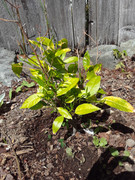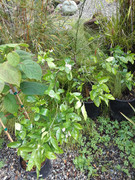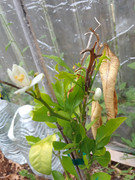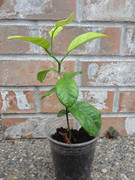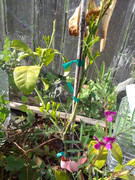1176
The Tropical Fruit Forum
Uniting Growers Worldwide!
News:
Email features have been reactivated 4/17/24
This section allows you to view all posts made by this member. Note that you can only see posts made in areas you currently have access to.
1177
Tropical Fruit Discussion / Re: IS it easier to grow Lychee or Longan in Southern California?
« on: June 19, 2018, 03:17:25 PM »
Longan is definitely easier to grow than lychee. It's more drought tolerant and has a little bit more cold tolerance. Longan also fruits more readily.
Lychee trees can be very finicky in Southern California, and need to be consistently and adequately watered, especially during the Summer. They don't like it too dry, and have problems with wind also. Lychee trees are slow growing, especially very small trees, often a bit frustratingly so. They'll steadily and gradually grow but it will be at a slow rate.
I like lychees much more than longan though, and if you can get it to fruit and grow, the payoff is well worth it.
Lychee trees can be very finicky in Southern California, and need to be consistently and adequately watered, especially during the Summer. They don't like it too dry, and have problems with wind also. Lychee trees are slow growing, especially very small trees, often a bit frustratingly so. They'll steadily and gradually grow but it will be at a slow rate.
I like lychees much more than longan though, and if you can get it to fruit and grow, the payoff is well worth it.
1178
Tropical Fruit Discussion / giving mangosteen a try in Southern California
« on: June 19, 2018, 02:14:05 PM »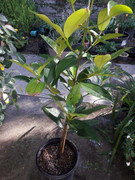
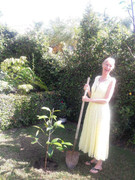
Just got it into the ground.
location is about 12 miles from the coast, so I would consider it solid zone 10 (between 10a and 10b)
That's a lychee and tree fern you see up in the top left in the picture.
This is a bigger specimen than most people have tried, so it already has a well developed root system and may have a better chance of surviving. This guy wasn't cheap. But it's a big beautiful plant. (yes, purple mangosteen)
1180
Tropical Fruit Discussion / Re: Lone lychee
« on: June 16, 2018, 12:04:09 AM »
Lychee are a very finnicky fruit, but the payoff when you do get a good harvest is well worth it. It can be a little hard getting lychee to reliably fruit in their optimal habitat (in Southern China). All the more so when they are in a less than optimal climate. Southern Florida probably has the climate closest resembling Southern China, more so than California (dry) or Hawaii (almost no Winter cold whatsoever).
1181
Citrus Buy, Sell, & Trade / Re: Dekopon seeds
« on: June 15, 2018, 11:54:35 PM »
I tried Dekapon from the supermarket and it's sweet, has a slight mango flavor resemblance, and is very rich. It's not to my taste though. (Although in fairness I do prefer varieties more on the aromatically tart side, like Satsuma, Duncan grapefruit, Valencia orange)
1182
Citrus General Discussion / Re: Nebraska retiree uses earths's heat to grow oranges in snow
« on: June 15, 2018, 11:40:09 PM »
Designing a system to drain out condensation in the pipes shouldn't be too complicated.
I don't see any reason why above ground (or shallow in ground) heat banks couldn't be used, assuming they were well insulated.
It could just be as simple as multiple stacked plastic brick containers of water, encassed in a double layer of pumice-rich concrete (low thermal conductivity). It would probably need to be somewhere around a fourth of the ground surface space of the greenhouse though, in size.
I don't see any reason why above ground (or shallow in ground) heat banks couldn't be used, assuming they were well insulated.
It could just be as simple as multiple stacked plastic brick containers of water, encassed in a double layer of pumice-rich concrete (low thermal conductivity). It would probably need to be somewhere around a fourth of the ground surface space of the greenhouse though, in size.
1183
Cold Hardy Citrus / Re: Citrus in the Pacific Northwest
« on: June 15, 2018, 08:27:13 PM »
keraji seedling
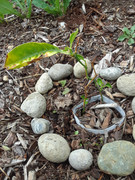
I planted it out in the ground mid-March and it lost all its leaves and partially died back just a little bit because of the cold temperatures, or sustained cool temperatures (not freezing though). However, it looks like it is now starting to come back, regrowing tiny little leaflets. I've been keeping it well watered.
Amazing, such a tiny seedling citrus would never have been able to survive out in the open ground in Southern California, the temperatures would be too hot and it would get dried out. So there is some irony to trying to grow in a cooler climate. It's very lush and green here and plants tend to grow very fast during the growing season (that is when the temperatures aren't too cool).

I planted it out in the ground mid-March and it lost all its leaves and partially died back just a little bit because of the cold temperatures, or sustained cool temperatures (not freezing though). However, it looks like it is now starting to come back, regrowing tiny little leaflets. I've been keeping it well watered.
Amazing, such a tiny seedling citrus would never have been able to survive out in the open ground in Southern California, the temperatures would be too hot and it would get dried out. So there is some irony to trying to grow in a cooler climate. It's very lush and green here and plants tend to grow very fast during the growing season (that is when the temperatures aren't too cool).
1184
Citrus General Discussion / Re: Nebraska retiree uses earths's heat to grow oranges in snow
« on: June 13, 2018, 10:26:42 AM »
It's not just the earth's heat. Heat that builds up in the greenhouse during the daytime is pumped down, using the earth below as a heat bank. The temperatures down there aren't very warm, but it's enough to keep the plants from freezing during the night. Instead of venting the heat out in the day, a fan circulates air down into pipes. A depth as shallow as 12 feet is enough to be functional.
1185
Cold Hardy Citrus / Re: Citrus in the Pacific Northwest
« on: June 13, 2018, 09:37:16 AM »
There's also an Ichang papeda growing in the Lan Su Chinese garden in Portland. It's in the ground planted up against a wall with good sun exposure. I saw a few small undeveloped fruits on it. The leaves smell slightly lemony but very mild, they don't smell like the leaves of Yuzu or Flying Dragon. It's definitely an Ichang papeda, I can tell by the leaves, perfectly symetrical sized leaf petioles and their plant guide also lists it as Citrus ichangensis.
1187
Citrus General Discussion / Re: Recommended citrus for a public garden
« on: June 08, 2018, 01:53:27 AM »Hmm...you know, there may be some potential there, maybe a microclimate in an entryway with a largely enclosed awning. I'll need to see what Hjördís is thinking for the outdoor areas.You might see this video, growing Meyer lemons outside on Vancouver Island which has very cool temperatures most of the year.
https://m.youtube.com/watch?v=XX-R8sq6-vg
1189
Citrus General Discussion / Re: Recommended citrus for a public garden
« on: June 07, 2018, 02:10:03 PM »
I'm managing to grow several varieties of cold hardy citrus outside in the Pacific Northwest (U.S.) zone 8a, but that's still quite a different climate from Iceland. The first part of the year, all the way till mid-May or June simply does not have warm enough temperatures to sustain citrus growth, so the growing season is confined to a few months in the Summer (all the way up till around mid-September about, but maybe sometimes October). Iceland simply does not have those warm Summers.
However, I've found that a simple plastic grow frame enclosure can increase the temperature all the way up to 90° (F) in April on a clear sunny day (when it might only be 60° outside). Just goes to show the power of the Greenhouse Effect. Some people put several containers of water inside to try to hold the heat during the night. Trying to use a passive enclosure can be a bit problematic here after March because, if not vented out, there can be a few days in April that get too sunny and hot. That probably would not be a problem in Iceland.
However, I've found that a simple plastic grow frame enclosure can increase the temperature all the way up to 90° (F) in April on a clear sunny day (when it might only be 60° outside). Just goes to show the power of the Greenhouse Effect. Some people put several containers of water inside to try to hold the heat during the night. Trying to use a passive enclosure can be a bit problematic here after March because, if not vented out, there can be a few days in April that get too sunny and hot. That probably would not be a problem in Iceland.
1190
Citrus General Discussion / Re: So citrus trees are *not* generally ideally full-sun plants?
« on: June 07, 2018, 02:01:42 PM »
A lot of this is totally climate dependent. In the hot dry summers of Southern California, plants tend to do better in a little bit of shade. Even plants that are said to do best in full sun. Somewhere further North with cooler temperatures, more sun is better.
In Iceland I definitely would not worry about citrus getting "too much" light.
In Iceland I definitely would not worry about citrus getting "too much" light.
1191
Citrus General Discussion / Re: Citrus Flowers
« on: June 07, 2018, 12:18:29 AM »
Really nice website, especially interesting to those fascinated with obscure citrus species and citrus breeding. (That's probably not a lot of people, but a lot of people here)
I was especially excited about your section on citrumelos growing in England.
I was especially excited about your section on citrumelos growing in England.
1192
Citrus General Discussion / Re: Recommended citrus for a public garden
« on: June 07, 2018, 12:01:04 AM »
For more of an academic interest, you might be interested in some of the more obscure Japanese varieties. These types may not be as easy to find. Keraji, Kinkoji (known as Bloomsweet grapefruit in the U.S.), Kunenbo (likely you will have to go to a Japanese botanical collection for that, quite a history behind it).
Some other uncommon interesting ones to grow would be Duncan citrumelo, pomelo (C. maxima, the ancestor of grapefruit), citron (the ancestor of lemons, and there's a Giant Etrog citron variety that may be interesting), and Ichang Papeda.
I don't know if there's any possibility of using the greenhouse space as a dual use citrus breeding space. I realize Iceland is too cold to grow citrus outside, but there are people growing certain species and hybrid citrus in England and Germany. Maybe you could use your space to try to breed cold-hardy varieties that taste better. That doesn't really require much work, just knowledge. Most of the work is just in growing and taking care of the plants, which you're going to do anyway. Maybe get a volunteer citrus breeding expert in there to collaborate on the project. This citrus guy could, in turn, get advice from many people in other countries on what different crosses to try to breed. Your greenhouse could turn out to be pretty valuable for posterity.
I'm doing cold-hardy citrus breeding work and wish I had some greenhouse space to leave my small seedlings until they grew into bigger fruiting plants. Then I'd do the pollination of the flowers by hand and collect the seeds from the fruits, to grow new hybrid seedlings. Growing little seedlings doesn't take up much space and I can do it in my home, but growing all those big fruiting plants would take a lot of greenhouse space. Someone to keep them watered (which you're going to be doing anyway in your project). Unfortunately I don't live in Reykjavik.
For mandarins I would recommend Satsuma and Shasta Gold. A lot of people love Page too, which is pretty similar to Minneola tangelo (also very delicious and a good one for your collection).
Kishu mandarins are also very easy to peel and very small (seedless too if they don't get pollinated), very fun.
Another thing I'd suggest to really save on energy during the night is using geothermal heat banking. This basically fans air through pipes running into the ground, so heat during the day gets stored in the ground. There are several videos on this, you might look into it.
https://www.youtube.com/watch?v=o2NtBCS2_WQ
https://www.youtube.com/watch?v=IZghkt5m1uY
A good depth would be 3.5 to 10 meters.
Some other uncommon interesting ones to grow would be Duncan citrumelo, pomelo (C. maxima, the ancestor of grapefruit), citron (the ancestor of lemons, and there's a Giant Etrog citron variety that may be interesting), and Ichang Papeda.
I don't know if there's any possibility of using the greenhouse space as a dual use citrus breeding space. I realize Iceland is too cold to grow citrus outside, but there are people growing certain species and hybrid citrus in England and Germany. Maybe you could use your space to try to breed cold-hardy varieties that taste better. That doesn't really require much work, just knowledge. Most of the work is just in growing and taking care of the plants, which you're going to do anyway. Maybe get a volunteer citrus breeding expert in there to collaborate on the project. This citrus guy could, in turn, get advice from many people in other countries on what different crosses to try to breed. Your greenhouse could turn out to be pretty valuable for posterity.
I'm doing cold-hardy citrus breeding work and wish I had some greenhouse space to leave my small seedlings until they grew into bigger fruiting plants. Then I'd do the pollination of the flowers by hand and collect the seeds from the fruits, to grow new hybrid seedlings. Growing little seedlings doesn't take up much space and I can do it in my home, but growing all those big fruiting plants would take a lot of greenhouse space. Someone to keep them watered (which you're going to be doing anyway in your project). Unfortunately I don't live in Reykjavik.
For mandarins I would recommend Satsuma and Shasta Gold. A lot of people love Page too, which is pretty similar to Minneola tangelo (also very delicious and a good one for your collection).
Kishu mandarins are also very easy to peel and very small (seedless too if they don't get pollinated), very fun.
Another thing I'd suggest to really save on energy during the night is using geothermal heat banking. This basically fans air through pipes running into the ground, so heat during the day gets stored in the ground. There are several videos on this, you might look into it.
https://www.youtube.com/watch?v=o2NtBCS2_WQ
https://www.youtube.com/watch?v=IZghkt5m1uY
A good depth would be 3.5 to 10 meters.
1193
Tropical Fruit Discussion / G. hombriana and G. mangostana, over two months
« on: June 06, 2018, 11:16:09 PM »
Here's G. mangostana growing in the same container right next to G. hombriana.
The first picture was taken April 4, the second one was taken today. (That gives you some idea of how much they grow, or don't grow, in two months time)
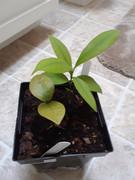
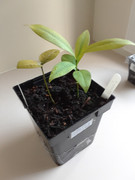
I plan to approach graft them later.
G. mangostana, as a younger seedling, is really hard to grow. All the conditions are optimized, it's inside an enclosure with high humidity, temperature controlled with a thermostat at 77-79°, and LED grow lights (combination of both red/blue/white), and not too much light either I might add, as I seemed to run into that problem with G. mangostana earlier.
Obviously G. hombriana is the plant that's doing better in the picture.
The first picture was taken April 4, the second one was taken today. (That gives you some idea of how much they grow, or don't grow, in two months time)


I plan to approach graft them later.
G. mangostana, as a younger seedling, is really hard to grow. All the conditions are optimized, it's inside an enclosure with high humidity, temperature controlled with a thermostat at 77-79°, and LED grow lights (combination of both red/blue/white), and not too much light either I might add, as I seemed to run into that problem with G. mangostana earlier.
Obviously G. hombriana is the plant that's doing better in the picture.
1194
Tropical Fruit Discussion / Re: Brewster lychee from Mexico 1.99lb at most Asian stores in Oc
« on: June 01, 2018, 11:40:21 PM »
No, the latest investigation pinpointed pesticides as the cause of the death, since those children peeled off the skin by biting into the exterior. They were using some dangerous pesticides on the lychee trees.
1195
Citrus Buy, Sell, & Trade / Re: Buy, sell, or trade pollen here?
« on: May 25, 2018, 01:17:22 PM »Citrus has a long juvenile period so if the cross is successful, it takes years to see the results.Under optimal growing conditions, inside a humidity controlled enclosure, maintained at the proper temperature and with grow lamps on 24 hours per day, I believe it's possible to go from seed to fruit within as little as 3 to 4 years. And that's not involving the use of grafting.
1198
Citrus General Discussion / Re: Growing lemons from seed?
« on: May 12, 2018, 08:11:40 PM »
Fruit trees grown from seed usually take longer to begin producing fruit than those that are grafted.
This is because inducing a slight degree of incompatibility diverts energy from tree growth towards fruit production early on. (Probably because the nutrient to energy ratio for producing fruit is different than growing branches)
This is because inducing a slight degree of incompatibility diverts energy from tree growth towards fruit production early on. (Probably because the nutrient to energy ratio for producing fruit is different than growing branches)
1199
Citrus General Discussion / Re: What is the best day time for pollination?
« on: May 08, 2018, 07:04:54 PM »
Probably early morning or evening, when it's not going to be too wet. Probably better not to do it on a windy day also.
I wouldn't do it in the morning if you're expecting that day to be very hot and very dry low humidity, which is often the case in some climates. However, in Germany, the issue would be more cold, so all this wouldn't apply. If it's outside, you may want to wait until May to pollinate (not that you may have much choice because they will flower when they flower). So in Germany it might be better to try it in the late morning.
I wouldn't do it in the morning if you're expecting that day to be very hot and very dry low humidity, which is often the case in some climates. However, in Germany, the issue would be more cold, so all this wouldn't apply. If it's outside, you may want to wait until May to pollinate (not that you may have much choice because they will flower when they flower). So in Germany it might be better to try it in the late morning.
1200
Citrus General Discussion / Re: Marsh Grapefruit- Taste - Time
« on: May 08, 2018, 02:14:12 AM »
Of course Duncan is the gold standard for grapefruit flavor.
SMF spam blocked by CleanTalk

